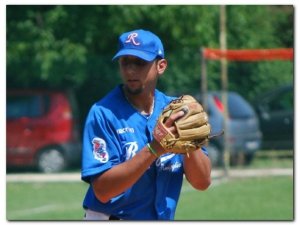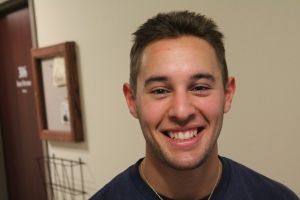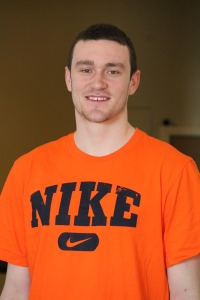History major Nick Barese ’08 was recently named head coach of Merrimack College’s baseball team. One Thing after Another recently caught up with Nick and asked him about his time at St. Anselm College, baseball, coaching, and Italy.
Q: Why did you decide to come to Saint Anselm College?
A: I was fortunate enough as a sophomore in high school to have a brother at Saint Anselm College. He played football, so I would spend most of my Saturdays at his games and on campus with my family. I knew early on I loved the campus environment, and after hearing him talk about the academic and athletic experiences, I was intrigued. It also helped my decision when the football and baseball programs began to recruit me. The “moment” when I decided I wanted to go to St. A’s was at a spring baseball doubleheader. The team was in the middle of a 12-game winning streak, and they won both games that day. I waited until after the games ended and told the coach right then and there that I wanted to go to school at Saint A’s.
Q: You played both football and baseball at Saint Anselm College. Did you find playing two sports particularly difficult? If so, how did you manage?
A: It was difficult from an athletic standpoint. I always felt as though I was missing out on part of the experience with each team. I did not participate in off-season workouts for one squad because I was always playing the other sport. I know bonds and camradery with teammates are built during the off-season, and I wanted to be a part of that dynamic.
Academically, though, it gave me structure. Knowing I would be busy athletically year round, I had to become skilled with time management. Of course, there were tough days, but I value the experience I had playing two sports. I always felt very fortunate to have that opportunity.
Q: What is the normal route by which somebody becomes a head baseball coach at a college? Is that the route you took?
A: I think of my route as pretty conventional. I was incredibly lucky after I finished playing in 2009 because Coach Rosen offered me a volunteer spot on his coaching staff. This opportunity allowed me to get my foot in the door. Before that point, as a player during my sophomore year, I had injured my shoulder and was out the whole season. As a result, I developed a great relationship with an assistant coach at the time, Jim Martin. He left to take an assistant job at Southern Connecticut State University in 2007, but when he became the head coach at Merrimack College in 2010 and asked me to join his coaching staff, I knew it was a great opportunity.
Q: As a coach, do you ever find yourself using the liberal arts skills that you learned as a student?
A: Absolutely. The skills I learned in the humanities program and many of my liberal arts classes are invaluable as a coach. Being able to communicate effectively to a group is a daily part of my life as a coach. Another component of my education that I still use is supporting my thoughts with evidence. When I want to convey a specific message to my team, I feel confident in my ability to explain why something is done a certain way. It also relates directly to the recruiting process. Speaking effectively with prospective players and their families is essential to building a program.
Q: According to your Merrimack biography, you played professional baseball in Italy for the Rangers Redipuglia Baseball Club. What was that like? Are there any striking differences between American and Italian baseball?
A: It was an incredible few months. There were almost no English-speaking people in the organization, so communication was tough initially. I lived in a very small town and rode a bike everywhere. Something as small as going grocery shopping and using euros was a struggle at first. Culturally, I was totally out of my comfort zone. But there were so many positives. I remember waking up one morning and spontaneously deciding to hop on a train to see Venice. That was an experience unlike any other.
It was also different handling adversity. If I did not play well during a game, the comforts of my friends and family were hard to come by. I grew up just an hour or so from St. A’s, so my parents found a way to make nearly every game during my four years at school. Not seeing them at my games in Italy definitely had an impact. I found out a lot about myself and really came to appreciate my time there. I think I grew up more during those three months than the previous 22 years of my life.
With regard to baseball, there were subtle differences, but the structure of the game was very similar. The one major difference was the meals during trips. I was used to having a sandwich or maybe a hamburger in the middle of a doubleheader. In Italy, we had pasta, prosciutto, espresso, and things like that. When we were traveling and staying in hotels, breakfast was very light. Players would have a croissant, or a pastry; meanwhile, I was craving bacon and eggs. It was different, but very enjoyable.




